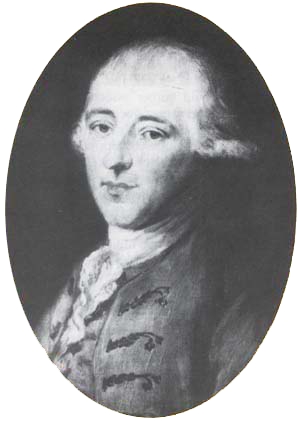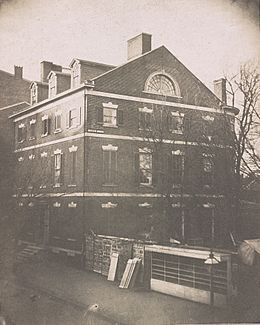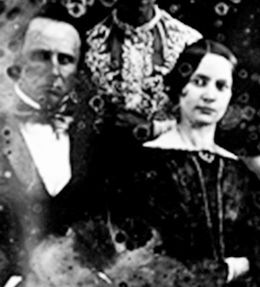Pierce Butler (American politician) facts for kids
Quick facts for kids
Pierce Butler
|
|
|---|---|
 |
|
| United States Senator from South Carolina |
|
| In office March 4, 1789 – October 25, 1796 |
|
| Preceded by | Inaugural holder |
| Succeeded by | John Hunter |
| In office November 4, 1802 – November 21, 1804 |
|
| Preceded by | John E. Colhoun |
| Succeeded by | John Gaillard |
| Delegate from South Carolina to the Congress of the Confederation | |
| In office May 25, 1787 – September 17, 1787 |
|
| Personal details | |
| Born | July 11, 1744 Garryhundon, County Carlow, Kingdom of Ireland |
| Died | February 15, 1822 (aged 77) Philadelphia, Pennsylvania, US |
| Resting place | Christ Episcopal Church and Churchyard, Philadelphia |
| Political party | Federalist, Democratic-Republican |
| Spouse | Mary Middleton |
| Children | 8 |
| Parents | Sir Richard Butler, 5th Baronet Henrietta Percy |
| Profession | Soldier, planter |
| Military service | |
| Allegiance | Great Britain United States |
| Branch/service | British Army South Carolina militia |
| Rank | Adjutant General Major (combat rank) |
| Battles/wars | American Revolutionary War |
Pierce Butler (July 11, 1744 – February 15, 1822) was an important figure in early American history. Born in Ireland, he became a successful rice planter and slaveholder in South Carolina. He was a soldier in the American Revolutionary War and is known as one of the Founding Fathers of the United States.
Butler played a key role in shaping the new nation. He served in the state legislature and the Congress of the Confederation. He was also a delegate to the 1787 Constitutional Convention, where he signed the Constitution of the United States. Later, he became a U.S. Senator.
As a large slaveholder, Butler supported the practice of slavery in America. He helped add the Fugitive Slave Clause to the Constitution. This clause protected the rights of slaveholders. He also wanted to count all enslaved people for state population totals. This would give Southern states more power in Congress. The Three-fifths Compromise eventually counted three-fifths of the enslaved population. This still gave Southern states more influence in the U.S. Congress.
Contents
Early Life
Pierce Butler was born on July 11, 1744, in Garryhundon, County Carlow, Ireland. His family was part of the Anglo-Irish Protestant upper class. He was the third son of Sir Richard Butler and Henrietta Percy.
He was a member of the Anglican Church. After the American Revolution, he joined the Episcopal Church. In 1773, he left the British Army. He then moved to South Carolina with his wife, Mary.
Revolutionary War Soldier
In 1779, Governor John Rutledge asked Butler to help organize South Carolina's defenses. Butler became the state's adjutant general, a high-ranking military position. He preferred to be called "Major," which was his highest combat rank.
Britain changed its war plan around 1778. Their forces in the northern colonies were stuck against George Washington's army. France was also thinking of joining the war to help the Americans. So, the British decided on a "southern strategy." They believed many Loyalists in the South would support them. They planned to conquer the colonies one by one, starting from Georgia. They captured Savannah in December 1778.
Butler helped gather South Carolina's militia to fight the British invasion. He also helped prepare state units for a counterattack in Georgia. During an attack on Savannah, Butler volunteered to assist General Lachlan McIntosh. However, the American militia was not ready, and the attack failed.
In 1780, the British captured Charleston, South Carolina. Most of the colony's government and military forces were taken. Butler managed to escape with a small command group. For the next two years, he worked on a plan to defeat the British in the South. He refused to give up.
He worked with militia members and veterans like Francis Marion and Thomas Sumter. They combined their efforts with the Southern Army. Butler was a special target for the British. He often barely avoided capture. He also gave money and supplies to help the American forces. He helped manage prisoner-of-war facilities.
Politician
After the Revolutionary War, Butler was not wealthy. Many of his farms and ships were destroyed. His international trade business was ruined. He traveled to Europe to get loans and find new markets.
In 1785, Butler returned to the United States. He spoke out for treating former Loyalists fairly. He also supported equal representation for people in the backcountry. The South Carolina legislature chose him to represent the state at the Constitutional Convention in Philadelphia in 1787.
At the convention, Butler strongly supported a strong union of the states. He also looked out for the interests of his region. He introduced the Fugitive Slave Clause. This clause protected slavery in the Constitution. He also supported a rule that stopped the government from regulating the international slave trade for 20 years. He wanted to count all enslaved people for Congress's population counts. He agreed to count three-fifths of them instead. This gave Southern plantation owners a lot of power in national politics.
Butler sometimes changed his political views. He supported the Constitution but did not attend South Carolina's meeting to approve it. He was elected to the United States Senate three times. He started as a Federalist but later joined the Jeffersonian party in 1795. By 1804, he called himself a political independent. After these changes, he was not elected to national office again. However, he was elected to the state legislature three more times.
Later Years
After his wife died in 1790, Butler sold his South Carolina properties. He invested in plantations on the Sea Islands of Georgia. He hired Roswell King to manage his plantations on St. Simon's Island and Butler Island. They sometimes disagreed because Butler wanted his enslaved people treated more moderately than King did. King left in 1820.
Butler retired from politics in 1805. He spent much of his time in Philadelphia, where he had a summer home. He became one of the wealthiest men in the country. He owned large amounts of land in several states. Like other Founding Fathers from his region, Butler continued to support slavery.
People called Butler "eccentric" and a "mystery." He wanted to create a strong central government. But he also wanted to protect the rights of individual citizens. He disagreed with the policies of the Federalists because he felt they ignored the interests of people in the west. He later disagreed with the Democrats for similar reasons. Butler believed in the importance of the common person. He once said that the American system was "little better than [a] matter of Experiment." He believed "much must depend on the morals and manners of the people at large."
Family and Legacy
In January 1771, Butler married Mary Middleton (c. 1750–1790). She was the daughter of a South Carolina planter and had inherited a large fortune. They had eight children, but only four daughters lived to adulthood. Only one daughter, Sarah Mease, married and had children.
Butler decided to leave his fortune to Sarah's three surviving sons. They had to change their last name to "Butler" to inherit. Two of them, John Mease and Pierce Butler Mease, changed their names.
Pierce Mease Butler
Pierce Mease Butler (1810–1867) inherited half of his grandfather's plantations. He married Fanny Kemble, a famous English actress, in 1834. They lived in Philadelphia and had two daughters.
In 1838–39, Pierce Mease Butler took his family to Georgia. His wife, Fanny Kemble, was shocked by the harsh living and working conditions of the enslaved people. She complained about their overwork and how the manager treated them. She later wrote about her experiences in a book. This book helped the abolitionist movement.
Pierce Mease Butler and Fanny Kemble had many disagreements. He threatened to stop her from seeing their daughters if she published her observations about the plantations. They divorced in 1849, and he kept custody of their daughters. Fanny Kemble published her book, Journal of a Residence on a Georgian Plantation in 1838–1839, in 1863.
The Great Slave Auction
By the mid-1800s, Pierce Mease Butler was very rich. But he lost much of his money. To avoid bankruptcy, he sold 436 enslaved people in 1859. This was the largest single slave auction in U.S. history. It happened at Ten Broeck Racetrack near Savannah, Georgia. He earned over $300,000 from the sale. This event was widely reported in national newspapers.
Legacy
Pierce Butler and many of his family members are buried at Christ Church, Philadelphia. This church is a National Historic Landmark. Butler Street in Madison, Wisconsin, is named after him.
See also
- Butler Island Plantation
- Lynx Incident
- List of United States senators born outside the United States
 | Delilah Pierce |
 | Gordon Parks |
 | Augusta Savage |
 | Charles Ethan Porter |



